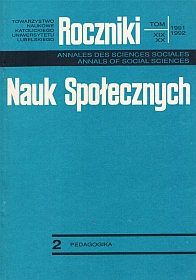Aktywność samowychowawcza a poczucie kontroli u dorastającej młodzieży
Abstrakt
This article is concerned with the problem of the selfbreeding activity in youth with a sense of internal and exfernal control. It seems that the sense of internal control is connected with high selfbreeding activity. To attempt to answer this question I have tested 180 person − 90 girls and 90 boys. With regards to the type of school, the group was not homogenious. The greater part of the boys was learning in the secondary house-building school (37% of all subjects), and greater part of the girls − in a secondary school (34%). The age of those under study was between 17 and 21 years old. All persons were tested by means of the Questionnaire Studying of sense of Control of Growing Youth (KBPK) worked out by A.Kurzyp and G. Krasowicz, and Questionnaire of Selfbreeding (S-W) worked out by the author. As auxiliary method I used free opinion about experience "to be master of myself". I used KBPK to seperate two groups out of those under study: with internal locus of control and with external locus of control. In my studies the lowest general result of a tested person was 8 (xmin = 8), and the highest − 37 (xmax =37). I used quartile deviation (Q) to appoint groups of external and internal locus of control. The persons who obtained results of I quarter (8-20 p.) constitute the group of external locus of control (group "Z"), and persons with the results of IV quarter (27-37 p.) constitute the group of internal locus of control (group "W").
Groups selected by KBKP (Z & W) obtained different results in Questionnaire S-W. Persons of W-group (M=76,71; SD=8,94)obtained higher coefficient of selfbreeding activity than persons of Z-group (M=67,23; SD=11.04). The difference is statistically significant (p=0,000; t=4,62). The sense of internal control in youth is connected with a higher level of selfbreeding, development of self-konwledge, self--determination and self-control.
Bibliografia
Filipczuk H., Rodzina i dzieci dorastające, Warszawa 1987, s.30−75.
Jundziłł I., O samowychowaniu, Warszawa 1975.
Kofta M., Kontrola psychologiczna nad otoczeniem: ramy pojęciowe teorii, "Psychologia Wychowawcza" 1977, nr 2, s.150−167.
Kozielecki J., Koncepcje psychologiczne człowieka, Warszawa 1980.
Kukołowicz T., Osoba i czyn a wychowanie w rodzinie, "Analecta Cracoviensia" 1973−1974, s.5−20.
Kurzyp A., Krasowicz G., Kwestionariusz do pomiaru poczucia kontroli u młodzieży dorastającej, [W:] Techniki kwestionariuszowe w diagnostyce psychologicznej. Wybrane zagadnienia, red. R. Ł. Drwal, Lublin 1987, s.39−62.
Łapińska R., Żebrowska M., Wiek dorastania, [W:] Psychologia rozwojowa dzieci i młodzieży, red. M. Żebrowska, Warszawa 1986, s.664−796.
Pacek S., Samowychowanie studentów. Warunki i efekty, Warszawa 1977, s.5−104.
Szmigielska B., Spostrzeganie związku pomiędzy własnym działaniem a jego następstwami przez dzieci w średnim wieku szkolnym, "Psychologia Wychowawcza" 1981, nr 4, s.469−480.
Szmigielska B., Pomiar poczucia kontroli nad ocenami szkolnymi u uczniów klas V−VIII, "Psychologia Wychowawcza" 1983, nr 1, s.35−44.
Uchnast Z., Orientacja humanistyczna w psychologii, Lublin 1983.
Wojtyła K., Osoba i czyn, Kraków 1969.
Copyright (c) 1992 Roczniki Nauk Społecznych

Utwór dostępny jest na licencji Creative Commons Uznanie autorstwa – Użycie niekomercyjne – Bez utworów zależnych 4.0 Międzynarodowe.


